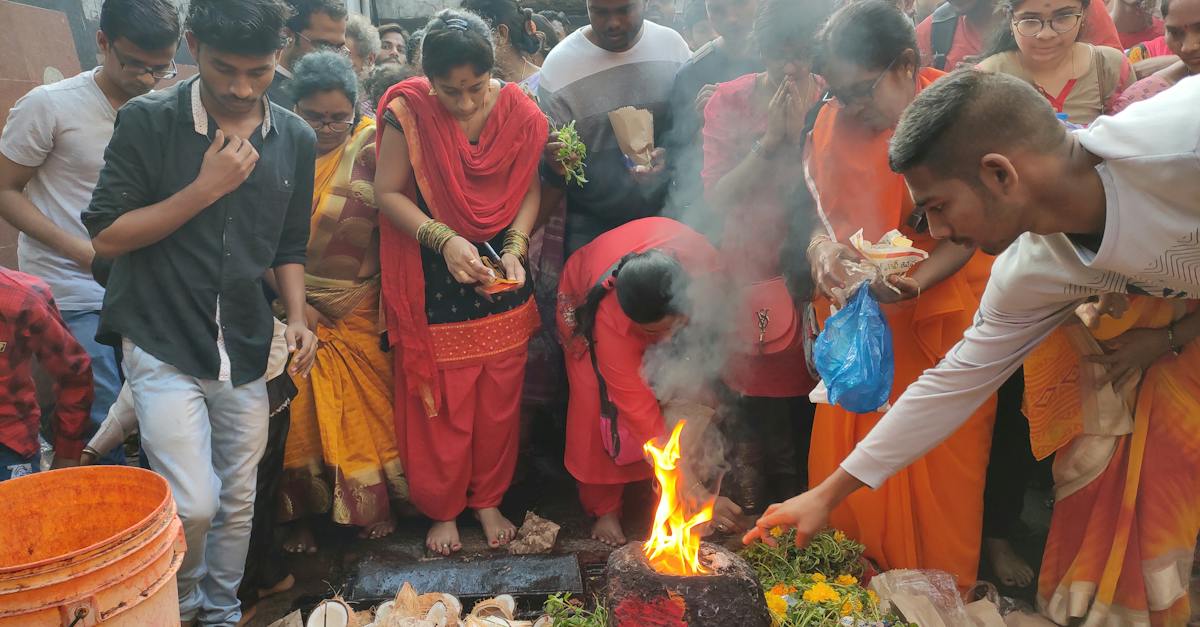Welcome to the exciting world of Hindu holidays in 2023! With a rich cultural heritage and a diverse range of celebrations, Hindu festivals offer a unique glimpse into the vibrant tapestry of traditions and customs. From the colorful and joyous festivals to the solemn and reflective observances, there is something for everyone to experience and learn from.
In the year 2023, Hindus around the world will be marking their calendars with a variety of significant events. These festivals not only hold religious importance but also serve as occasions for family gatherings, community bonding, and spiritual growth. Whether you are a devout follower of Hinduism or simply curious about different cultures, join us as we explore some of the major Hindu holidays that await us in 2023.
From Diwali, the festival of lights, to Holi, the festival of colors, each Hindu holiday in 2023 offers its own unique rituals, traditions, and symbolism. So, get ready to immerse yourself in the vibrant festivities, delicious food, and age-old customs that make Hindu holidays truly special. Let’s dive into the calendar of Hindu holidays in 2023 and discover the beauty and significance behind each celebration.
Hindu Holidays in 2023: A Vibrant Tapestry of Traditions and Customs
Holi, also known as the Festival of Colors, marks the arrival of spring and is celebrated with great enthusiasm throughout the Hindu community. This joyous festival is typically observed in March and is characterized by throwing colored powders and water at one another, symbolizing the triumph of good over evil. It is a time when people come together to celebrate the changing of seasons, engage in playful festivities, and strengthen their relationships with family and friends. The vibrant colors and cheerful atmosphere make Holi a truly memorable experience.
Another significant Hindu holiday in 2023 is Diwali, also known as the Festival of Lights. Celebrated in October or November, Diwali is one of the most eagerly awaited festivals in the Hindu calendar. During this time, homes are adorned with lamps and colorful decorations, and firecrackers light up the night sky. Diwali signifies the victory of light over darkness and good over evil. It is a time for families to come together, exchange gifts, and indulge in delectable sweets and savories. The brilliance of Diwali festivities is a testament to the rich cultural heritage of Hindu traditions.
In addition to Holi and Diwali, there are several other Hindu holidays in 2023 that hold immense religious and cultural significance. These include Raksha Bandhan, a festival celebrating the bond between brothers and sisters; Ganesh Chaturthi, a festival honoring Lord Ganesha, the remover of obstacles; and Navaratri, a nine-night celebration dedicated to the worship of the divine feminine. Each of these holidays has its own unique rituals, traditions, and symbolism that add depth and meaning to the festivities.
The vibrant tapestry of Hindu holidays in 2023 showcases the diversity and richness of Hindu culture. Whether it’s the colorful celebrations of Holi, the dazzling spectacle of Diwali, or the sacred traditions of Raksha Bandhan and Navaratri, these festivals connect individuals to their heritage, foster community spirit, and promote spiritual growth. In 2023, immerse yourself in the joy and beauty of Hindu holidays by participating in these age-old customs, savoring the delicious food, and embracing the vibrant traditions that make them truly special.
Diwali: The Festival of Lights
Diwali is one of the most important and widely celebrated Hindu holidays in 2023. Also known as the Festival of Lights, it symbolizes the victory of light over darkness and good over evil. Diwali is observed in either October or November, according to the Hindu lunar calendar.
During this auspicious occasion, homes and streets are adorned with colorful decorations, oil lamps, and strings of lights. The festival brings together family and friends, as they gather to celebrate and participate in various rituals.
One of the key traditions of Diwali is the lighting of diyas, which are small clay lamps filled with oil. These diyas are believed to invite the blessings of the goddess Lakshmi, who is considered the deity of wealth and prosperity. Families also engage in rangoli, creating intricate and vibrant patterns using colored powders or rice flour at their doorsteps.
Firework displays are another highlight of Diwali celebrations. The night sky comes alive with a spectacular show of lights and colors, signifying the triumph of light over darkness. It is a time of joy and merriment, with people exchanging gifts and sweets with loved ones.
Apart from the festivities, Diwali holds deep spiritual and religious significance. It marks the return of Lord Rama to Ayodhya after his victory over the demon king Ravana, as depicted in the epic Ramayana. The lighting of diyas signifies the illumination of one’s inner self and the removal of ignorance.
Diwali is not just limited to India; it is celebrated by Hindu communities around the world. The festival showcases the vibrant cultural heritage of Hindus and brings people together in the spirit of unity and love.
Diwali, the Festival of Lights, is a joyous celebration that signifies the triumph of light over darkness. It is a time for family gatherings, vibrant decorations, and the exchange of gifts. The festival holds both spiritual and cultural significance, inviting individuals to embrace the positive energy and harmonious atmosphere that Diwali creates.
Holi: The Festival of Colors
Holi is one of the most vibrant and joyous festivals celebrated by Hindus around the world. Also known as the Festival of Colors, it is a time of exuberant celebrations and a symbol of the triumph of good over evil. Holi usually takes place in March and is eagerly awaited by people of all ages.
During Holi, friends and families come together to shower each other in a riot of colors. It’s a playful occasion where people smear each other with powdered colors and throw water balloons in a festive atmosphere. The streets come alive with laughter, music, and dance as people indulge in this joyful celebration. Holi also marks a time for reconciliation and strengthening of relationships, as people forgive and forget past grievances, spreading love and harmony.
The significance of Holi goes beyond its colorful festivities. It has deep roots in Hindu mythology and tradition. According to legends, Holi celebrates the victory of Lord Krishna over the demoness Holika, who was immune to fire. This victory of good over evil is commemorated with great enthusiasm during Holi.
Holi is also associated with the arrival of spring and the rejuvenation of nature. The vibrant colors used during the festival are believed to represent the blooming flowers, spreading joy and heralding the arrival of a new season. It is a time to let go of the past and embrace the freshness and vitality of spring.
Overall, Holi is a time of merriment, togetherness, and the renewal of spirits. It brings people closer, bridges gaps, and fosters a sense of unity. The Festival of Colors radiates positive energy and creates a harmonious atmosphere that resonates with the spirit of love and joy. Holi truly encapsulates the essence of Hindu celebrations and continues to be celebrated with enthusiasm, making it one of the most anticipated festivals of the year.
The article continues with another section about Diwali, the Festival of Lights.
Navaratri: Celebrating the Divine Feminine
Navaratri, meaning “nine nights,” is a Hindu festival that celebrates the divine feminine energy in its various forms. It is a vibrant and joyful festival that takes place over nine nights and ten days. Navaratri is observed in the autumn season, typically in the month of September or October.
During Navaratri, Hindus worship the goddess Devi in her different manifestations, including Durga, Lakshmi, and Saraswati. Each day of the festival is dedicated to a different form of the goddess, and devotees engage in special prayers, rituals, and fasting to seek her blessings.
The festival holds profound spiritual and cultural significance. It honors the divine feminine power, which is seen as the creative force behind the universe. It symbolizes the triumph of good over evil and the power of light over darkness. The nine nights represent the nine forms in which the goddess is worshipped, and the tenth day, known as Vijayadashami, marks the victory of Goddess Durga over the buffalo demon Mahishasura.
During Navaratri, vibrant dances called Garba and Dandiya Raas are performed in many parts of India. These dances involve rhythmic movements and the use of colorful sticks or wooden clubs. They are a beautiful expression of joy and devotion, bringing people together to celebrate the spirit of Navaratri.
The festival is also an occasion for wearing traditional attire, exchanging sweets and gifts, and participating in various cultural events. It is a time for families and communities to come together and revel in the festive atmosphere.
Navaratri is a celebration of the divine feminine energy that nurtures and empowers. It promotes the values of love, compassion, and inner strength. Through the worship of the goddess, Hindus seek blessings for prosperity, good health, and spiritual growth.
Navaratri is a significant festival in the Hindu calendar, and its significance extends beyond religious boundaries. It is a time of joy, unity, and reverence for the divine feminine. The festival radiates a sense of positivity and creates an atmosphere of harmony and happiness.
Overall, Navaratri is a joyful and spirited celebration that honors the divine feminine energy and promotes a deeper connection with the divine. It is a time of worship, dance, music, and community bonding. During these nine nights, devotees immerse themselves in the beauty and power of the goddess, seeking her blessings and embracing the divine within themselves.
Raksha Bandhan: A Celebration of Sibling Bond
Raksha Bandhan is an important Hindu festival that celebrates the sacred bond between brothers and sisters. It is a day dedicated to honoring and strengthening the sibling relationship. The festival is observed on the full moon day of the Hindu month of Shravana, which usually falls in the month of August.
The term “Raksha Bandhan” translates to “the bond of protection” in Hindi. This festival holds significant cultural and emotional importance in Hindu communities all around the world. On this day, sisters tie a sacred thread called a “rakhi” around their brothers’ wrists, symbolizing their love, sincerity, and devotion. In return, brothers offer gifts and promise to protect and support their sisters throughout their lives.
The tradition of Raksha Bandhan has many legends associated with it. One popular myth revolves around the bond between Lord Krishna and his sister, Draupadi. According to the legend, when Draupadi tore a piece of her saree to stop the bleeding from Krishna’s wrist, he pledged to protect her in every situation. This incident became the inspiration for the ritual of tying the rakhi.
Raksha Bandhan is not limited to biological siblings only. It extends to include cousins, close friends, and even neighborhood brothers and sisters. The festival promotes unity, love, and respect among siblings and emphasizes the importance of cherishing and nurturing these relationships.
During Raksha Bandhan, families come together, exchange gifts, and enjoy traditional meals. Sisters meticulously select the perfect rakhi for their brothers, ranging from simple threads to intricately designed ones adorned with beads, zari work, and other decorative elements. Brothers reciprocate their sisters’ love by showering them with presents, often including money or tokens of affection.
In addition to symbolizing the bond between siblings, Raksha Bandhan also carries spiritual significance. It is believed that the rakhi thread has the power to protect and ward off negative forces, bringing blessings and good luck to both the brother and sister. It is a time for siblings to express gratitude, forgiveness, and appreciation for one another.
Raksha Bandhan is a beautiful celebration that reaffirms the special bond between siblings. It encapsulates the values of love, protection, and support, creating lasting memories and strengthening family ties. This festival highlights the importance of nurturing and cherishing the relationships that bring joy and support into our lives.
Ganesh Chaturthi: Honoring the Elephant-Headed Deity
Ganesh Chaturthi is another significant Hindu festival that holds great importance in the year 2023. This festival is dedicated to Lord Ganesha, the elephant-headed deity who is revered as the remover of obstacles and the god of wisdom, knowledge, and prosperity.
The celebration of Ganesh Chaturthi usually takes place in late August or early September, depending on the lunar calendar. It lasts for ten days, with the grandest festivities occurring on the final day, known as Ananta Chaturdashi. During this period, devotees set up beautifully adorned temporary structures called pandals in their homes or community spaces and install clay idols of Lord Ganesha.
The rituals associated with Ganesh Chaturthi are performed with great reverence and devotion. The festival begins with the pranapratishtha, which involves invoking the presence of Lord Ganesha into the idol through sacred chants and rituals. This is followed by the shodashopachara, where sixteen types of offerings, including flowers, fruits, sweets, and incense, are presented to the deity. Throughout the ten-day celebration, devotees offer prayers, perform aarti (ritual of worship with lamps), and sing devotional hymns.
On the final day of Ganesh Chaturthi, the idols are taken in grand processions amidst vibrant music, dance, and chants of “Ganpati Bappa Morya!” (meaning “Lord Ganesha, come again soon!”). The idols are then immersed in bodies of water, symbolizing the departure of Lord Ganesha back to his abode while seeking his blessings.
Ganesh Chaturthi holds deep cultural and social significance in Hindu communities. It not only fosters a sense of unity and community spirit but also promotes environmental consciousness. In recent years, efforts have been made to create eco-friendly idols made from natural materials, such as clay and plant-based dyes, to minimize the impact on water bodies.
This auspicious festival serves as a reminder to seek Lord Ganesha’s blessings in facing life’s obstacles, to cultivate wisdom and prosperity, and to embrace the spirit of unity and devotion. Ganesh Chaturthi is a time to honor and celebrate the presence of the elephant-headed deity in Hindu culture and to express gratitude for his divine qualities.
Conclusion: Embracing the Richness of Hindu Festivals in 2023
As 2023 unfolds, the Hindu community eagerly anticipates the celebration of various festivals that hold deep cultural and spiritual significance. From the vibrant and playful Holi to the illuminating Diwali, these festivals bring joy, unity, and a sense of devotion among believers. The divine feminine energy is celebrated during Navaratri, while the sacred bond between brothers and sisters is honored during Raksha Bandhan.
Ganesh Chaturthi, with its grand festivities and eco-friendly initiatives, allows devotees to seek Lord Ganesha’s blessings and embrace unity and devotion. These festivals not only provide an opportunity for individuals to connect with their faith but also serve as a reminder to cultivate wisdom, prosperity, and environmental consciousness.
In 2023, let us immerse ourselves in the richness of Hindu festivals, embracing their traditions, rituals, and values. May these celebrations bring us closer to our roots, foster love and respect within our families and communities, and inspire us to lead lives filled with unity, devotion, and spiritual growth.
Frequently Asked Questions
Q: What are the major Hindu festivals discussed in the article?
A: The article discusses Holi and Diwali, two major Hindu festivals. It also introduces Navaratri, Raksha Bandhan, and Ganesh Chaturthi.
Q: When is Raksha Bandhan celebrated?
A: Raksha Bandhan is observed on the full moon day of the Hindu month of Shravana, usually falling in August.
Q: What is the significance of Raksha Bandhan?
A: Raksha Bandhan celebrates the sacred bond between brothers and sisters. Sisters tie a sacred thread called a “rakhi” around their brothers’ wrists to symbolize love and devotion. The festival promotes unity, love, and respect among siblings.
Q: Who can participate in Raksha Bandhan?
A: Raksha Bandhan extends to include cousins, close friends, and even neighborhood brothers and sisters.
Q: What is the significance of Ganesh Chaturthi?
A: Ganesh Chaturthi is dedicated to Lord Ganesha, the remover of obstacles and the god of wisdom, knowledge, and prosperity. The festival promotes unity, community spirit, and environmental consciousness.
Q: How long does Ganesh Chaturthi last?
A: Ganesh Chaturthi is celebrated for ten days, with the grandest festivities occurring on the final day.




